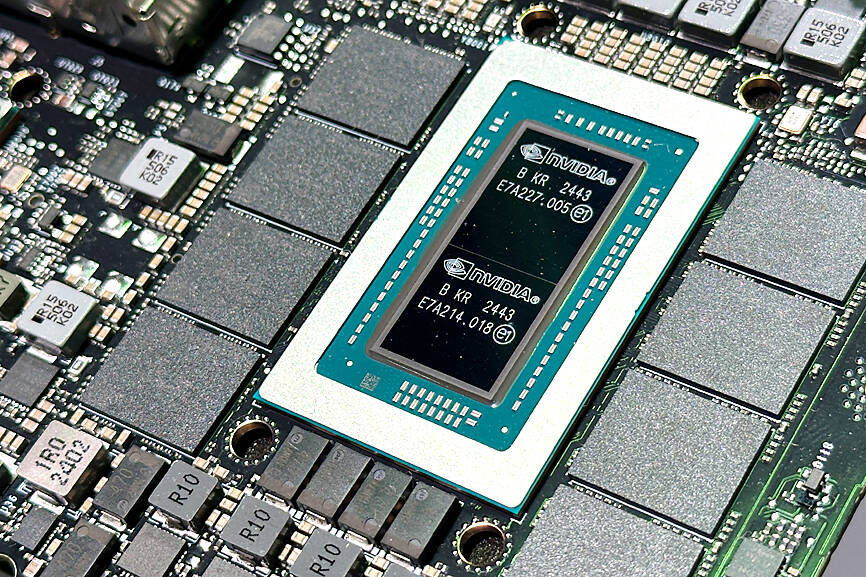Artificial intelligence (AI) giant Nvidia Corp’s most advanced chips would be reserved for US companies and kept out of China and other countries, US President Donald Trump said.
During an interview that aired on Sunday on CBS’ 60 Minutes program and in comments to reporters aboard Air Force One, Trump said only US customers should have access to the top-end Blackwell chips offered by Nvidia, the world’s most valuable company by market capitalization.
“The most advanced, we will not let anybody have them other than the United States,” he told CBS, echoing remarks made earlier to reporters as he returned to Washington from a weekend in Florida.

Photo: Reuters
“We don’t give [the Blackwell] chip to other people,” he said during the flight.
The remarks suggest Trump might impose tighter restrictions around cutting-edge US AI chips than US officials previously indicated, with China and potentially the rest of the world barred from accessing the most sophisticated semiconductors.
The Trump administration in July released a new AI blueprint seeking to loosen environmental rules and vastly expand AI exports to allies, in a bid to maintain the US’ edge over China in the critical field of AI tech.
Nvidia on Friday said it would supply more than 260,000 Blackwell AI chips to South Korea and some of the country’s biggest businesses, including Samsung Electronics Co.
Questions have also swirled about whether Trump would allow shipments of a scaled-down version of Blackwell chips to China since August, when he suggested he might allow such sales.
Trump told CBS he would not allow the sale of the most advanced Blackwell chips to Chinese companies, but he did not rule out a path for them to obtain a less capable version of the chip.
“We will let them deal with Nvidia, but not in terms of the most advanced,” he said during the interview.
The possibility that any version of Blackwell chips might be sold to Chinese firms has drawn sharp criticism from China hawks in Washington, who fear the technology would supercharge China’s military capabilities and accelerate its AI development.
US Representative John Moolenaar, who chairs the House Select Committee on China, said such a move “would be akin [to] giving Iran weapons-grade uranium.”
Nvidia has not sought US export licenses for the Chinese market because of Beijing’s stance on the company, CEO Jensen Huang (黃仁勳) said last week.
“They’ve made it very clear that they don’t want Nvidia to be there right now,” he said during a developers’ event in Washington, adding that it needed access to China to fund US-based research and development.

Micron Memory Taiwan Co (台灣美光), a subsidiary of US memorychip maker Micron Technology Inc, has been granted a NT$4.7 billion (US$149.5 million) subsidy under the Ministry of Economic Affairs A+ Corporate Innovation and R&D Enhancement program, the ministry said yesterday. The US memorychip maker’s program aims to back the development of high-performance and high-bandwidth memory chips with a total budget of NT$11.75 billion, the ministry said. Aside from the government funding, Micron is to inject the remaining investment of NT$7.06 billion as the company applied to participate the government’s Global Innovation Partnership Program to deepen technology cooperation, a ministry official told the

Taiwan Semiconductor Manufacturing Co (TSMC, 台積電), the world’s leading advanced chipmaker, officially began volume production of its 2-nanometer chips in the fourth quarter of this year, according to a recent update on the company’s Web site. The low-key announcement confirms that TSMC, the go-to chipmaker for artificial intelligence (AI) hardware providers Nvidia Corp and iPhone maker Apple Inc, met its original roadmap for the next-generation technology. Production is currently centered at Fab 22 in Kaohsiung, utilizing the company’s first-generation nanosheet transistor technology. The new architecture achieves “full-node strides in performance and power consumption,” TSMC said. The company described the 2nm process as

Shares in Taiwan closed at a new high yesterday, the first trading day of the new year, as contract chipmaker Taiwan Semiconductor Manufacturing Co (TSMC, 台積電) continued to break records amid an artificial intelligence (AI) boom, dealers said. The TAIEX closed up 386.21 points, or 1.33 percent, at 29,349.81, with turnover totaling NT$648.844 billion (US$20.65 billion). “Judging from a stronger Taiwan dollar against the US dollar, I think foreign institutional investors returned from the holidays and brought funds into the local market,” Concord Securities Co (康和證券) analyst Kerry Huang (黃志祺) said. “Foreign investors just rebuilt their positions with TSMC as their top target,

H200 CHIPS: A source said that Nvidia has asked the Taiwanese company to begin production of additional chips and work is expected to start in the second quarter Nvidia Corp is scrambling to meet demand for its H200 artificial intelligence (AI) chips from Chinese technology companies and has approached contract manufacturer Taiwan Semiconductor Manufacturing Co (TSMC, 台積電) to ramp up production, sources said. Chinese technology companies have placed orders for more than 2 million H200 chips for this year, while Nvidia holds just 700,000 units in stock, two of the people said. The exact additional volume Nvidia intends to order from TSMC remains unclear, they said. A third source said that Nvidia has asked TSMC to begin production of the additional chips and work is expected to start in the second